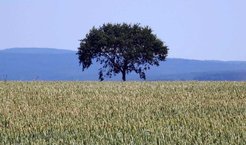Similar characteristics found in both domesticated and wild species
Researchers from 19 Institutions, including the Max Planck Institute for Biogeochemisty, have analysed and published the biological traits and evolutionary placement for a set of more than 1000 domesticated species around the world. This work provides the scientific community with a detailed database, which will permit to address new questions.

The species of plants and animals that we use for food provision, such as wheat or sheep, were formerly wild species, which underwent domestication since the late Paleolithic. In this context, a set of researchers has united efforts to build a global database on the evolution and biological traits of more than 1000 domesticated species. “We set up to address two objectives”, explains Ruben Milla, first author of the article “first, we asked if plant and animal domesticates belong to a few or to many evolutionary lineages and, second, we inquired if those species shared biological characteristics with their wild relatives”.
The main finding of the study is that the traits of domesticated species are a subgroup of those we find in wild species. For instances, even if agricultural species tend to yield big seeds, or livestock species tend to be large in size, those traits can also be found among wild species.
This work calls to amplify the search for new species that can be used as human food in the future. The results could be used to pinpoint which are the relevant traits of food species, and in this way facilitate the search of wild species that portray such characteristics.
Food species in the tree of life
An additional contribution of the study is the finding that food plants come from very diverse evolutionary origins, whereas livestock animals belong to a few linages. “Even if some of the main agricultural crops belong to a few botanical families, such as the legumes or the grasses, we find food plants in many other evolutionary linages of plants”, says Jens Kattge, coordinator of the TRY database which supplied trait data. Thus, this study will provide the scientific community with a valuable database on food species and their wild relatives, which will enable future research in this area.












